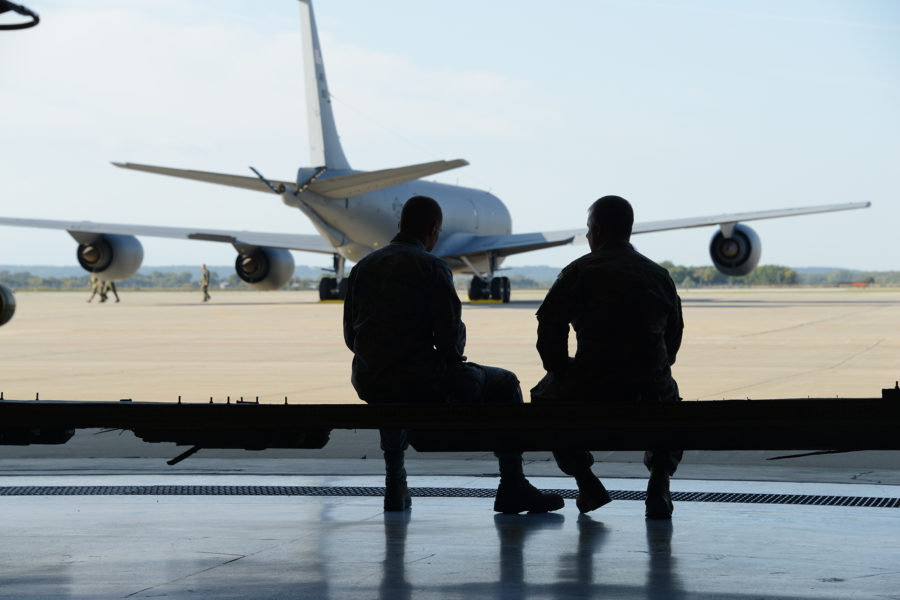The Department of the Air Force’s recently released reports on interpersonal violence and on gender, race, and ethnic disparities are linked to the issue of suicide in the military, Air Force Secretary Frank Kendall said in a Facebook town hall Nov. 18.
These recent reports have revealed data showing stark differences in promotions, discipline, trust in leadership, and other areas between white male service members and women and racial and ethnic minorities. They have also included tens of thousands of Airmen, Guardians, and civilians within the DAF reporting some action that resulted “in psychological or physical harm or that detracts from a culture of dignity and respect.”
Taken together, these issues contribute to one of Kendall’s most pressing concerns, he said.
“I want to make a connection between these two reports, in a way, and the other thing that has been happening in the force that keeps me awake at night,” Kendall said. “It’s the number of suicides we have. … And I think every one of these is in some way an institutional failure. It’s a leadership job to make sure people are educated about the issues they face. It’s a leadership job to make sure that people understand that when they do have a problem, that they can get help and that it’s OK to do that.”
The interpersonal violence survey, which asked respondents about 81 different behaviors identified on a “continuum of harm,” found that many Airmen and Guardians did not report incidents because they didn’t believe it was serious enough or they did not think their leaders would do anything about it. Kendall called that “disturbing” and pointed to the need for leaders to do better in supporting their troops, whether they’re facing disparity or interpersonal violence.
“If you take the case of suicide, for example, there’s the individual who is involved, and there are the people that know him and are around him and see him often and have an opportunity to intervene and help him or her. That’s something that the whole chain of command has to emphasize all the time,” Kendall said. “Similarly for the disparity, any inequities that we see, we have to act on, we have to deal with them. Interpersonal violence, in the study, often takes the form of bullying or hazing. It’s not physical violence. It’s emotional damages. It’s violence that’s done to someone’s psyche, to their mental health, as opposed to their physical health, and it certainly has implications for their health overall.”
Indeed, the survey classified actions like spreading workplace rumors and verbal harassment as interpersonal violence. And actions like those were often not reported, Air Force Chief of Staff Gen. Charles Q. Brown Jr. said. But that speaks to a broader issue that “our Airmen and Guardians felt that if they did report, nothing would happen,” Brown said. “And maybe from negative past experience or with those that they serve with, they’ve seen examples where we, as a command or leadership, didn’t respond with the right processes.”
By taking a more expansive look at interpersonal violence, the Air Force hopes to gain a better understanding of how to monitor and deal with issues that could be “precursors” to other forms of violence, Undersecretary of the Air Force Gina Ortiz Jones added.
“The more that we know, the better prepared we’re going to be to be able to address these things,” said Ortiz Jones. “That’s why one of the things we’re looking at as it relates to that is better understanding activities, for example, like grooming and stalking—things that we don’t necessarily talk as much about … but as best we can understand some of these kinds of behaviors that indicate or are precursors, rather, to other forms of interpersonal violence, the best we’ll be able to respond, prevent those things.”
If certain minority groups lack trust in commanders to solve issues, especially of interpersonal violence, they will be more vulnerable and isolated, Ortiz Jones said. And fixing that trust in leaders to encourage reporting will require a comprehensive effort, Chief of Space Operations Gen. John W. “Jay” Raymond said.
“It isn’t one leader. … It’s leadership at all levels. It’s leadership from frontline supervisors all the way up through the leadership of the service that you see here on the screen,” Raymond said. “So to call on the leaders would be to call on everybody in the leadership roles that you’re in to make sure that we’re providing an environment that is conducive for folks to come to work and do the mission that is so critical, and to do it in a way that they feel empowered and safe.”
“I would tell every one of our Airmen and Guardians, … ‘Don’t stop there,’” Bass said. “Gen. Raymond just talked about leaders at every level, and that holds all of us. Every leader has a leader above them. We have chains of command.”
Should Airmen and Guardians report interpersonal violence only to be dismissed by their direct leadership, Chief Master Sgt. of the Air Force JoAnne S. Bass said they should continue to press the issue.
